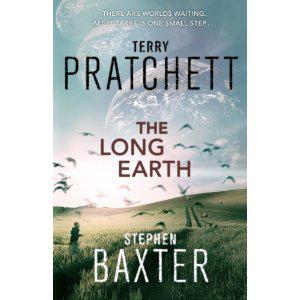Occasionally a new series is announced on television. The director is someone well known, the lead actors are famous, the production has obviously (from the trailers) had a lot of money spent on it. So you tune in with high expectations.... but end up a bit underwhelmed - the whole is less than the sum of the parts. Somewhere the story has been lost.
The premise of the novel is simple but well realised. The idea of multiple parallel universes has been around for a long time, but Pratchett/Baxter's idea is to ask - "What if we could travel easily to and from these worlds?" This is the "Long Earth" of the title. The challenge these writers faced was to take this idea and overlay it with a story, without letting the conceit overwhelm the narrative. Broadly speaking I don't think they achieved this. They explore a lot of the issues that the Long Earth presents - how would migration to these new worlds affect the old earth, what about those who are unable to travel, (stepping), what would the new worlds be like - almost like an intellectual exercise. New species and civilisations are discovered, but the heart of the novel is a journey to the far reaches of the Long Earth to discover a new form of intelligent life, that may or may not represent a threat to the rest of civilisation.
There are a huge number of threads left hanging at the end of the novel - the mysterious Black corporation, for example, is mentioned in passing as some kind of global MegaCorp, but this goes nowhere. Joshua the main character is built up as a messiah-like figure and there are references to "the Silence" that aren't properly explored or explained. Equally there is little of the typical Pratchett whimsy - the organic matter that drives the stepping devices is a potato (why?), and we are told about but do not meet a religious cult that believes all of existence is a practical joke. There are also some obvious traces of Pratchett in the character of Lobsang, a hyper-intelligent robot that passes the Turing test and claims to be the reincarnated spirit of a Tibetan priest. But the lightness of touch which usually characterises Pratchett's writing is largely missing. In its stead are long passages describing the journey West through the long earth. (Incidentally, the journey West is a deliberate and explicit echo of the journey across the Wild West of the USA, without the red indians/native americans.
Pratchett started a story based on the idea of the Long Earth and stepping between worlds, in the 1980's, and abandoned it, presumably because he wasn't able to craft a story out of it. DiscWorld might have got in the way a bit as well. Bringing in a sci-fi writer (Baxter is often described as a "hard sci-fi" writer - I can only guess this means he doesn't normally include any fantasy element in his work) to help finish the work was misconceived - Pratchett already had the sci-fi component of his story, what he needed was a strong plot to bring to life the world he had created.
Despite a literal big bang, the book actually ends with a bit of a whimper, and it is made obvious that we are being invited to participate in a series of novels - the Long Earth perhaps becoming the new DiscWorld, with characters such as the police officer we meet but who has very little to do in this novel becoming more central, having their own plot lines, etc. If that inference is correct it is a fine ambition, and I am sure I will keep reading - for now.

No comments:
Post a Comment